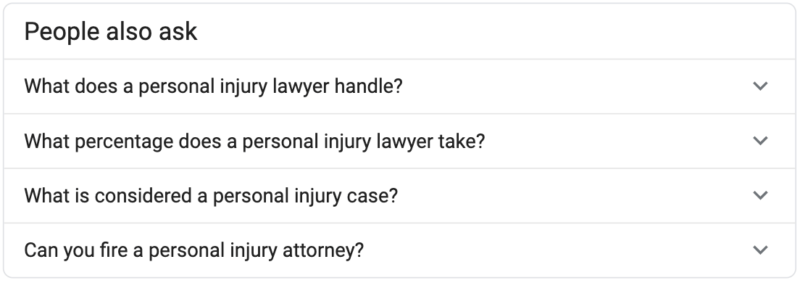Don’t overlook these 5 quick updates to boost your search ranking
Focus on pages on the brink of page 1 ranking but don’t forget about quick fixes to 301 redirects, People Also Ask and FAQ structured data optimizations.
Most aspects of an SEO campaign take significant time to research and implement, but there are always a few relatively quick tactics to boost results. Here’s a list of low-hanging SEO fruit that to grab right now.
Mine the ‘People Also Ask’ box for content
“People Also Ask” has been dominating SERPs for some time. This makes sense since most searches are questions asking Google to answer them. However, not all searches are phrased as questions.
For example, the search query “Personal Injury Lawyer,” Google is returning the “People Also Ask” box in the number one organic spot. That’s because it’s throwing out several questions to find out more about the intent of the query. Look to the PAAs for questions to develop FAQs on relevant pages. It is also a great tactic to add more content to a page and align it with voice-related search patterns.

Utilize new FAQ structured data
Experiment with the new FAQ structured data to get answers to show up in search results.
One caveat: Your content may provide the searcher’s answer in the SERPs, so there’s no need to click through to your site. Test to make sure this won’t affect traffic and conversions.
Remove 301 redirect chains
A 301 redirect chain is when there is more than one redirect between a URL and its destination URL.
When creating a redirect, have a single 301 redirect from one URL point directly to the final location. Redirect chains happen when websites migrate to SSL without checking that all previous URLs end in a single step to the HTTPS version
Here’s an example:
HTTP://www.domain.com → HTTPS://www.domain.com → HTTPS://domain.com
(where the final destination is non-www)
When the original URL redirects to the secure URL, but you want the non-www as canonical, it has to redirect again. This can lead to loss of link equity, create crawl problems for search engine bots, and affect page speed and server resources. The easiest way to remedy a 301 redirect chain is through your website’s host or download a redirect plugin.
Improve pages that can make the most impact
Look for pages ranking at the bottom of page one to the top of page two that would benefit from optimization to quickly improve in rankings.
The content can be updated by:
- Adding a FAQ section with “People Also Ask” data
- Increasing the word count of the page by at least 1,000 words
- Adding different kinds of content, such as bulleted lists or images
After updating, submit the page to Google in Search Console to ensure it’s crawled quickly.
Optimize internal links
When it comes to links, most people think only of inbound/backlinks but pay attention to internal links as well.
While it seems logical to link anywhere on your site without an issue, having internal links going all over the place creates a lot of problems.
Internal links should be targeted and follow a hierarchical structure. This is important for several reasons:
- It improves navigation for both users and search engines.
- It creates a logical hierarchy for crawlers to follow – the way a bot crawls your site is via links that it follows to the next page, where it finds another link to follow, and so on.
- It allows inbound links to pass weight through the different pages within a topic. Assuming you’re keeping content siloed or categorized, a link to a top-level page that internally links to relevant sub-level pages will bleed some of that authority down.
Keep in mind that every worthwhile SEO task doesn’t have to be a heavy lift. Take advantage of easy updates that can yield great results without a large site overhaul. These are opportunities no SEO practitioner should miss.
Contributing authors are invited to create content for Search Engine Land and are chosen for their expertise and contribution to the search community. Our contributors work under the oversight of the editorial staff and contributions are checked for quality and relevance to our readers. The opinions they express are their own.
Related stories
New on Search Engine Land